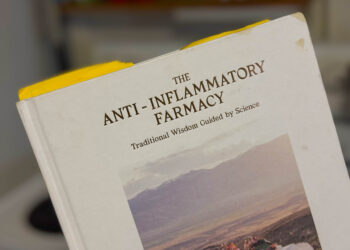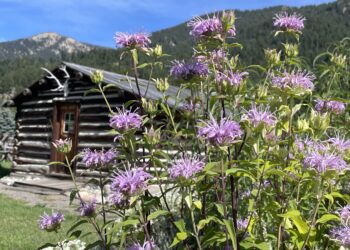Fatal pneumonia outbreak from domestic sheep kills bighorn sheep.
By Benjamin Alva Polley EBS COLUMNIST

In my last article, I wrote about winterkill in Wyoming’s pronghorn antelope population and how hundreds starved because they were already weakened by bacterial pneumonia, coupled with not finding a snow-free winter range for grazing. This week’s column deals with another type of pneumonia affecting North America’s bighorn sheep.
Each winter, one of Canada’s native bighorn sheep herds migrates out of the Rockies for lower-elevation habitat near Radium Hot Springs, British Columbia. The west-facing, rolling grassland steppes below the rocky crags surrounding the town are usually snow-free, making them the ideal winter range. Rams, ewes, and lambs congregate in subgroups on the edge of town and along the highway, where there are private land holdings. This brings them close to people and their animals and the potential for contact with domestic sheep farms. These two species are closely related, can mate, and have offspring. Unfortunately, wild sheep can suffer irreversible health impacts with that close contact. Domestic sheep are often carriers of respiratory bacteria that can be transmitted to bighorns. Although these bacteria usually cause only minor symptoms in domestic sheep, they can lead to fatal consequences for the bighorns, causing pneumonia that can lead to die-offs and permanent impacts on populations.
Helen Schwantje, a retired wildlife veterinarian (emeritus) for British Columbia, is trying to limit the transmission of this fatal pneumonia by raising awareness through education and hands-on management. Schwantje has been studying this disease for decades. She did her master’s thesis on this topic in the 1980s in this region.
“Animals at high density have a much easier time transmitting infectious organisms because they’re closer together,” she said.
Mycoplasma ovipneumoniae (M. ovi) is one species of a family of highly infectious bacteria. They enter their host’s nasal passages, attach to the lining cells and cause mucus production and changes in the lower airways that allow additional pathogenic (disease-causing) bacterial species to invade the lungs. The changes lead to coughing and sneezing and often fatal pneumonia. The bacteria are aerosolized within droplets and transmitted to the next animal. Bighorns can seek out domestic sheep during the rut or share feed and water, bringing them into nose-to-nose contact. Once passed to the following individual, that animal can continue the spread to the rest of the herd. The development of a pneumonia outbreak can affect adjacent sub-groups and populations up and down the Rockies as animals travel.
“There might be 35% to 85% of the population die initially, but arguably the biggest issue is the impact on lamb survival over time,” Schwantje said. If ewes survive the initial disease event and continue to carry the organism, their lambs will likely be infected from close contact with their mom in the following years.
“While the mom may produce protective antibodies in her colostrum to protect her lamb, that protection is short-lived. Most often, that lamb will develop pneumonia and die before six weeks of age,” she said.
As lambs age, they band with other lambs and form nursery groups. That mingling allows the further spread of pathogens amongst the group, with most lambs dying by late summer. In fact, while there are other causes of lamb losses, one of the ways to tell if a bighorn sheep herd has respiratory disease issues is to see if there are any lambs in early autumn.
Sheep owners
Most people in the Pacific Northwest live here for the beauty and the wildlife. Nobody wants to kill wildlife inadvertently.
“Most people who own sheep know nothing about M. ovi and have no idea they may impact their natural environment and the animals that live there,” Schwantje said.
Sheep owners can help by educating themselves about this organism and how it affects their animals and wildlife.
“The only way we will achieve anything is by working with people. We can’t tell people what to do on their private land, but we all care about the planet and want to minimize our impact as much as possible,” Schwantje said.
Owners may have access to help. They can contact their wildlife agency and their veterinarian to ask about existing testing and separation programs. M. ovi can affect domestic sheep but is usually less severely than their wild cousins, affecting growth rates and poorer wool quality reported. However, some producers experience higher financial impacts from disease outbreaks. Keeping the two species apart has been the most practical solution to preventing transmission in the past. Still, Schwantje is currently doing trials with specific antibiotic treatments to clear domestic sheep of bacteria.
“There is no vaccine,” she said. “Interestingly, people always gravitate toward the idea of a vaccine. I think it’s probably a hangover from the pandemic.”
Experimental trials
The success of treatment to clear animals is far from 100% guaranteed. Several flocks have been treated, and the data is still being analyzed, but the trials appear more successful with smaller flocks of less than 20 animals. The owners and Schwantje test the sheep by swabbing the nose. If all animals in a flock are negative by a PCR test on the swab, it’s a good sign that the flock is not infected, but annual monitoring is advised. If some test positive, a discussion is started on what is next. For the experimental trial, infected animals are separated. The treatment involves using the antibiotic by injection and flushing the nose with antibiotic and saline solution for several days in a row. Animals are retested within a month.
“If animals are still testing positive after treatment, we discuss culling the animal so that it is no longer a risk to the population, but we continue to work on other solutions. We work with the owners to find a solution that helps their animals, fits their circumstances, and protects wild sheep,” Schwantje said.
BC Government
The recently released film Transmission highlights how serious an issue bighorn health is for the BC government and their partners who manage wild sheep. Some M. ovi-infected bighorn populations have declined and are in danger of disappearing. An experiment is underway where bighorn ewes in such herds are captured in nets from a helicopter. In the first year of this project, animals were blindfolded, placed in a body bag, and long-lined to a processing site to be sampled and tested on-site using an innovative testing protocol. After an hour, the test result was confirmed. If the animal was positive, animals were killed. If negative, they were released. The film demonstrates how far the partnership was willing to go—to protect bighorns by killing sheep who test positive. Results from this experiment have shown that lamb survival was restored after removing females that carried the bacteria.
“Sometimes you have to kill the individual to save the herd,” she says.
The disease is avoidable, and while the situation is complicated, there can be successful solutions by working collaboratively.
Benjamin Alva Polley is a place-based storyteller with stories published in Outside, Adventure Journal, Popular Science, Field & Stream, Esquire, Sierra, Audubon, Earth Island Journal, Modern Huntsman, and other publications at his website www.benjaminpolley.com/stories. He holds a master’s in Environmental Science and Natural Resource Journalism from the University of Montana.














